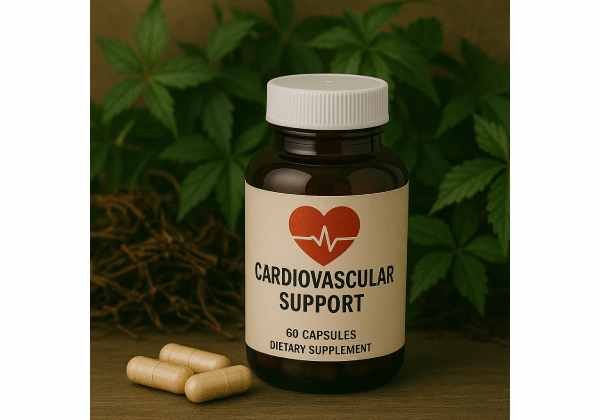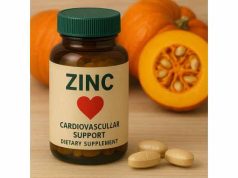
Welcome to this comprehensive guide on Jiaogulan (Gynostemma pentaphyllum)—an extraordinary herb renowned for its ability to improve cardiovascular health and protect the heart. Whether you are seeking to stabilize blood pressure, enhance circulation, or address common heart-related conditions, Jiaogulan’s multifaceted properties may offer you a natural advantage. In this article, you will discover what makes Jiaogulan unique, how it supports cardiovascular function, and the best ways to incorporate it into your wellness routine. Let’s begin exploring why so many health enthusiasts are turning to Jiaogulan for heart health and overall vitality.
Table of Contents
- Comprehensive Profile of Jiaogulan (Gynostemma pentaphyllum)
- How Jiaogulan Demonstrates Its Heart-Protective Effects
- Scientific Findings on Cardiovascular Enhancements
- Recommended Intake, Applications, and Safety
- Frequently Asked Questions
- References and Sources
Comprehensive Profile of Jiaogulan (Gynostemma pentaphyllum)
Jiaogulan (scientifically known as Gynostemma pentaphyllum) is a herbaceous climbing vine native to regions of Asia, including China, Japan, and parts of Southeast Asia. Often referred to as the “Immortality Herb,” it has gained a remarkable reputation for its potential to promote longevity and shield the cardiovascular system from various stressors. Among its many uses, Jiaogulan for Heart Health and Jiaogulan for Cardiovascular Health stands out as a primary area of interest in modern herbal research.
Historical Context and Traditional Uses
- Traditional Chinese Medicine (TCM) Roots
In TCM, Jiaogulan is commonly compared to ginseng for its adaptogenic qualities. Practitioners have long prescribed it to fortify the body’s resilience, stabilize internal systems, and support energy levels. This historical context is often cited as a starting point for modern scientific exploration into its cardiovascular benefits. - Cultivation and Harvesting
Jiaogulan grows in mountainous or subtropical areas and is typically harvested by collecting its leaves. Farmers then dry or process these leaves for use in teas, extracts, or capsules. The climate and soil quality where Jiaogulan is cultivated can significantly influence its phytochemical concentration, making region-specific research valuable to understand potency. - “Adaptogenic” Nature
The term “adaptogen” refers to any natural substance believed to help the body adapt to stressors. Adaptogenic herbs like Jiaogulan can play a crucial role in helping the body maintain balance, especially under conditions of emotional strain, physical fatigue, or environmental challenges. This adaptogenic factor is closely tied to Jiaogulan Helps Cardiovascular Function, as stress can have profound impacts on heart health. - Comparison to Ginseng
Jiaogulan has earned the nickname “Southern Ginseng,” reflecting its chemical composition and related benefits. Like true ginseng, Jiaogulan contains saponins, specifically gypenosides, that are attributed to its therapeutic properties. Researchers continually compare these gypenosides with ginsenosides in Panax ginseng to assess their parallel or synergistic roles in cardiovascular health. - Widespread International Recognition
Though traditionally consumed in Asian cultures, Jiaogulan has crossed borders and is now available worldwide in various forms—dry leaves for tea, powdered supplements, liquid tinctures, and even functional food products. Its international popularity has fueled a surge of clinical research focused on substantiating its health claims, especially those that revolve around the heart and circulatory system.
Key Phytochemical Constituents
- Gypenosides
Gypenosides are a type of saponin found almost exclusively in Jiaogulan. These compounds are often linked to the herb’s potential in modulating blood pressure, cholesterol levels, and other cardiovascular metrics. The exact number of identified gypenosides in Jiaogulan can vary depending on the source, but each variant is believed to contribute to the herb’s broad health profile. - Flavonoids
Jiaogulan boasts an array of flavonoids—plant compounds known for their antioxidant capabilities. Antioxidants fight oxidative stress, which is a notable factor in arterial plaque formation, hypertension, and other cardiovascular conditions. By mitigating oxidative damage, flavonoids in Jiaogulan may help keep blood vessels flexible and resilient. - Polysaccharides
Polysaccharides in Jiaogulan can help enhance immune response and may have additional benefits for regulating energy. While these effects are not as prominent in cardiovascular discussions as gypenosides and flavonoids, their presence underscores Jiaogulan’s comprehensive wellness profile. - Chlorophyll and Essential Amino Acids
As a leafy vine, Jiaogulan contains chlorophyll, which supports healthy red blood cell production, among other functions. Some research also indicates the presence of essential amino acids that contribute to overall metabolic well-being.
Cultural and Regional Variations
- Traditional Preparations
In some regions, Jiaogulan leaves are fried lightly in oil or baked to make unique snacks. Elsewhere, they are brewed into tea or added to soup as a culinary flourish. The method of preparation can alter the bioavailability of crucial compounds, influencing how strongly the herb affects the cardiovascular system. - Global Adaptation
Jiaogulan has found a place in Western herbal compendiums, with many countries classifying it as a dietary supplement rather than a strictly medicinal agent. This global acceptance further broadens the scope of research and usage patterns, providing data from diverse populations and healthcare contexts. - Integration into Holistic Programs
Beyond TCM, holistic practitioners worldwide have begun to integrate Jiaogulan into wellness protocols aimed at stress management, energy balance, and heart care. By combining Jiaogulan with other supportive herbs and lifestyle modifications, individuals may find it easier to cultivate long-term cardiovascular health.
Unique Selling Points for Heart Health
- Multidimensional Impact
One reason why Jiaogulan Benefits for Heart Health resonates with so many individuals is its capacity to address multiple cardiac risk factors—such as high cholesterol, high blood pressure, and endothelial dysfunction—simultaneously. - Potential Support for Healthy Blood Pressure
Preliminary studies show that Jiaogulan may help regulate blood pressure through nitric oxide modulation and other mechanisms. This aspect is of particular interest for those at risk of hypertension-related complications. - Cholesterol Modulation
Some research suggests that Jiaogulan may help support healthy HDL (good) cholesterol while managing LDL (bad) cholesterol levels. By promoting a healthier lipid profile, Jiaogulan helps cardiovascular function on a foundational level. - Energy and Vitality
As an adaptogen, Jiaogulan might help the body cope with physical exertion and recuperate faster, indirectly contributing to heart health by facilitating regular exercise and reducing the strain that comes from prolonged fatigue.
In essence, Jiaogulan stands out as an herb that not only has deep cultural and historical roots but also offers modern relevance. Through its distinct constituents such as gypenosides, flavonoids, and polysaccharides, Jiaogulan can fit well into targeted cardiovascular wellness strategies.
How Jiaogulan Demonstrates Its Heart-Protective Effects
A major question arises when discussing Jiaogulan for Heart Health: How does it actually work within the body to support the cardiovascular system? To address this, researchers have examined the underlying biochemical pathways and physiological actions tied to Jiaogulan’s core compounds. By examining these mechanisms, we can better understand why Jiaogulan is touted as a premier botanical for heart and circulatory well-being.
1. Modulating Nitric Oxide Production
- Vasodilation and Blood Flow
Nitric oxide (NO) is a vital molecule in the circulatory system, acting as a vasodilator to help blood vessels relax and expand. Gypenosides in Jiaogulan are believed to stimulate the production of nitric oxide, potentially improving blood circulation. When blood vessels function optimally, the heart experiences less strain, supporting both systolic and diastolic balance. - Reduced Oxidative Stress
By encouraging healthy NO levels, Jiaogulan also reduces oxidative stress in endothelial cells. Excess oxidative stress can degrade nitric oxide, limiting its benefits. Thus, Jiaogulan’s antioxidant properties further amplify this vasodilating process, helping preserve the normal function of blood vessels over time.
2. Regulating Lipid Profiles
- Impact on Cholesterol
High levels of LDL cholesterol can initiate plaque buildup within arterial walls, elevating the risk of heart disease. Some preliminary studies suggest that Jiaogulan may influence enzymes responsible for cholesterol metabolism. The regulation of these enzymes might help maintain balanced lipid profiles and a more favorable LDL-to-HDL ratio. - Lowering Triglycerides
Triglycerides, another type of lipid found in the blood, can also increase the risk of cardiovascular conditions when elevated. Jiaogulan’s gypenosides and flavonoids may help reduce triglyceride levels through improved lipid metabolism, though further large-scale human trials are needed to substantiate this claim definitively.
3. Balancing Blood Pressure
- Adaptive Blood Pressure Control
Many people struggle with hypertension, a chronic elevation of blood pressure that exerts continuous stress on the cardiovascular system. Research indicates that Jiaogulan might assist in keeping blood pressure at healthier levels by regulating the renin-angiotensin-aldosterone system (RAAS). This system controls fluid balance and vascular constriction, both key factors in blood pressure regulation. - Stress and Tension Management
Chronic stress can exacerbate high blood pressure. With its adaptogenic profile, Jiaogulan may help the body cope with stress hormones like cortisol. Lower stress levels can thus indirectly contribute to healthier blood pressure readings over time.
4. Strengthening Endothelial Integrity
- Preventing Endothelial Dysfunction
The endothelium, a thin membrane lining blood vessels, plays a pivotal role in vascular health. When this layer becomes dysfunctional, it increases susceptibility to inflammation, plaque accumulation, and erratic blood pressure. Jiaogulan’s antioxidant and anti-inflammatory effects may help maintain endothelial vitality, reducing the risk of arterial stiffening. - Enhanced Cellular Communication
By promoting better nitric oxide signaling and reducing internal inflammatory markers, Jiaogulan helps cardiovascular function by ensuring that endothelial cells can effectively communicate with surrounding muscle tissues. This communication is essential for adaptive vascular responses such as constriction, dilation, and overall blood flow management.
5. Antioxidant Shielding
- Combatting Free Radicals
Free radicals are unstable molecules that can damage cells if left unchecked. This oxidative damage is a major driver behind atherosclerosis and other cardiovascular ailments. Jiaogulan’s diverse range of antioxidants—from gypenosides to flavonoids—neutralizes these harmful particles, preventing oxidative harm that might otherwise escalate into serious heart conditions. - Synergistic Effect with Diet
Adding Jiaogulan to a heart-friendly diet rich in fruits, vegetables, and whole grains amplifies the total antioxidant defense. Synergy between the antioxidants in foods and those in Jiaogulan can help extend the protective benefits throughout the circulatory network.
6. Hormonal and Metabolic Regulation
- Blood Sugar Considerations
While not primarily marketed as a diabetes supplement, some studies allude to Jiaogulan’s capacity to assist in regulating glucose metabolism. Better glycemic control inherently supports cardiovascular well-being, as chronic high blood sugar can damage blood vessels and predispose individuals to heart disease. - Alleviating Energy Crashes
One of Jiaogulan’s less-discussed attributes is its potential to minimize sudden drops in energy. This can encourage individuals to stay more active and adhere to exercise routines, indirectly benefiting the heart through consistent physical activity.
7. Stress Response and Adaptogenic Benefits
- Cortisol Reduction
Cortisol spikes can trigger long-term issues such as weight gain, immune suppression, and blood pressure elevations. By helping the body adapt to stress, Jiaogulan may indirectly prevent the cascade of health concerns that stem from chronic cortisol elevation, offering an extra layer of support to heart health. - Better Sleep Quality
High-quality rest is fundamental to cardiovascular recovery. When the body is under less stress, restorative processes can proceed more efficiently, helping to maintain stable blood pressure, regulated heart rate, and healthy endothelial function.
8. Potential Anti-Inflammatory Effects
- Inflammation in Heart Disease
Chronic inflammation is a central player in the development of atherosclerosis, hypertension, and other heart-related conditions. Preliminary findings suggest Jiaogulan may help regulate key inflammatory markers, like interleukins and C-reactive protein, thereby offering a shield against escalated inflammatory activity in arterial walls. - Joint Benefits and Blood Flow
Some individuals who experience inflammation also suffer from limited mobility, which in turn restricts exercise—a key component for heart health. By reducing systemic inflammation, Jiaogulan might encourage a more active lifestyle, further enhancing circulation.
9. Safety of Mechanisms
- Selective Action
One aspect that intrigues researchers is Jiaogulan’s seeming ability to “selectively” modulate various pathways without causing drastic, unintended shifts in bodily functions. This selectivity is theorized to result from its adaptogenic nature, which seeks to normalize physiological processes rather than push them in a single direction. - Tolerance and Efficacy
Over time, many herbs lose efficacy due to the body’s adaptation. However, reports on Jiaogulan often highlight sustained benefits when combined with a balanced diet and healthy lifestyle, implying that it may retain its protective impact over extended use.
In summary, Jiaogulan’s heart-protective mechanisms are manifold—ranging from vasodilation and improved lipid metabolism to anti-inflammatory and antioxidant actions. This multi-targeted approach distinguishes Jiaogulan from single-action supplements, making it a compelling candidate for individuals looking to optimize heart function and cardiovascular resilience.
Scientific Findings on Cardiovascular Enhancements
As interest in Jiaogulan for Cardiovascular Health continues to rise, researchers have conducted multiple studies to gauge its efficacy in tangible ways. While more extensive human trials remain warranted, existing scientific literature provides valuable insights into how Jiaogulan could serve as a supportive ally in the quest for a healthier heart.
1. Clinical Trials and Observational Studies
- Blood Pressure Regulation
A few controlled trials have indicated that people consuming Jiaogulan tea or supplements demonstrated modest but notable reductions in both systolic and diastolic blood pressure. These changes were generally linked to improvements in endothelial function and blood vessel elasticity. - Lipid Profile Improvements
Some small-scale human studies reported that individuals taking Jiaogulan extracts experienced better ratios of HDL to LDL cholesterol. Although these findings are preliminary, they indicate the herb’s potential role in supporting healthy cholesterol metabolism—one of the cornerstones of comprehensive heart care. - Enhancing Cardiac Output
Emerging research suggests that Jiaogulan may boost cardiac output during physical activity, allowing for greater oxygenation and nutrient delivery throughout the body. Enhanced cardiac output can lead to improved exercise tolerance and reduced stress on the heart.
2. Animal Model Research
- Atherosclerosis Prevention
In animal models designed to mimic human atherosclerosis, Jiaogulan supplementation was observed to curtail plaque formation. This outcome is partly attributed to the herb’s antioxidant effects, reduced lipid peroxidation, and stabilization of arterial walls against oxidative stress. - Cardioprotective Enzymes
Studies on rats and mice have also shown that Jiaogulan may raise the activity of certain cardioprotective enzymes, like superoxide dismutase (SOD), which neutralizes harmful free radicals. Increased SOD levels translate to better protective measures against cardiovascular degeneration.
3. Mechanistic Insights from In Vitro Experiments
- Anti-Inflammatory Gene Expression
Laboratory tests on human endothelial cells revealed that Jiaogulan compounds might downregulate genes involved in inflammatory pathways. This suggests a molecular basis for the herb’s vascular protection, particularly against conditions initiated by chronic inflammation. - Influence on Nitric Oxide Synthase
In vitro experiments have also highlighted how Jiaogulan can stimulate nitric oxide synthase (NOS), the enzyme responsible for nitric oxide production in blood vessels. Enhanced NOS activity is critically linked to better vasodilation and circulation.
4. Areas of Ongoing Investigation
- Dosage Standardization
One of the main hurdles in broader research acceptance is the need for standardized dosing. Gypenosides are key compounds, yet their concentration differs from product to product. Ongoing studies aim to identify optimal gypenoside levels for consistent cardiovascular benefits. - Long-Term Safety
While many short-term studies underline Jiaogulan’s favorable safety profile, long-term data are essential. Researchers are exploring whether extended use might lead to sustained heart health improvements, and whether any cumulative side effects might emerge over time. - Synergistic Potential
Scientific inquiry has begun to examine the synergy between Jiaogulan and other herbs or pharmaceuticals. Understanding how these combinations either amplify or counterbalance Jiaogulan’s benefits could provide more fine-tuned guidelines for patient care, particularly for individuals with existing heart conditions.
5. Real-World Application
- Lifestyle Integration
Beyond the laboratory, countless anecdotes from individuals and healthcare practitioners suggest that Jiaogulan, when combined with healthy eating and routine exercise, supports cardiovascular wellness. People have reported feeling more energetic, experiencing stable blood pressure readings, and enjoying overall improvements in endurance. - Use in Complementary and Integrative Medicine
Medical professionals specializing in integrative health often recommend Jiaogulan as a complementary aid alongside standard heart medications. However, they emphasize monitoring for interactions, especially in individuals already on prescription drugs for hypertension or high cholesterol.
6. Translating Scientific Evidence into Daily Practice
- Heart Rate Variability (HRV)
Some practitioners measure heart rate variability to track cardiovascular adaptation to stress. Jiaogulan’s adaptogenic potential may help optimize HRV, which is often linked to autonomic nervous system balance—a factor closely tied to heart performance. - Stress Management Techniques
Combining Jiaogulan supplementation with relaxation techniques like mindfulness, yoga, or breathwork can yield a more substantial impact on heart health. Many professionals view Jiaogulan as a biochemical tool that complements psychological and lifestyle-based interventions.
7. Limitations of Current Research
- Small Sample Sizes
Many of the existing human trials are small-scale, limiting the generalizability of findings. Larger, more diverse sample populations are necessary to draw stronger conclusions about Jiaogulan’s cardiovascular impact. - Variability in Product Quality
Not all Jiaogulan supplements are created equal. Differences in growing conditions, harvest times, and extraction methods can drastically affect the final product’s potency. Consequently, research outcomes can vary widely based on the specific supplement used. - Regulatory Hurdles
In some regions, herbal supplements face strict regulatory scrutiny. Gaining approval for larger clinical trials can be challenging, slowing the pace of definitive research outcomes that physicians and consumers can rely upon.
8. Moving Forward
- Focus on Personalized Medicine
As the healthcare field progresses toward personalized treatment, Jiaogulan may fit into individualized regimens tailored to each person’s unique metabolic profile and cardiovascular risk factors. Genomic studies in the future could also unveil how genetic variations influence one’s responsiveness to Jiaogulan. - Integration with Modern Technology
Advanced technologies like high-throughput screening and metabolomics could uncover novel compounds within Jiaogulan or unique interactions between existing ones. This approach might refine our understanding of dosage, synergy, and potential side effects. - Expansion into Global Phytomedicine
Jiaogulan’s growing popularity ensures ongoing global research. We can expect continuous updates on clinical applications, mechanistic nuances, and innovative product formulations. Such advancements hold promise for integrating Jiaogulan into mainstream medical protocols for managing cardiovascular risk.
In conclusion, while the evidence base for Jiaogulan’s cardiovascular benefits is robust enough to spark optimism, further in-depth studies are needed to formalize treatment guidelines and recommendations. Still, the existing body of research strongly supports the notion that Jiaogulan helps cardiovascular function through multiple channels—offering a holistic, scientifically grounded path to better heart health.
Recommended Intake, Applications, and Safety
When exploring any supplement—especially one as biochemically rich as Jiaogulan—it is crucial to understand the best practices for safe and effective use. Below, we delve into dosage considerations, common administration forms, potential side effects, and overall safety measures for those interested in harnessing Jiaogulan Benefits for Heart Health.
1. Typical Dosages
- Teas and Infusions
A widely recommended form is Jiaogulan tea made by steeping 1–2 teaspoons of dried leaves in hot water for approximately 5–10 minutes. Individuals often consume this beverage 2–3 times a day, though personal tolerance and health goals can influence frequency. - Capsules and Tablets
Standardized supplements can range anywhere from 200 mg to 600 mg per capsule. Most healthcare professionals suggest a daily dosage between 600 mg and 1200 mg, split into two or three doses. Always check the label for gypenoside concentration to determine potency. - Tinctures or Liquid Extracts
With liquid extracts, dosage may vary widely based on product concentration. Typical guidelines might suggest taking 20–30 drops of a tincture, 2–3 times per day. Users should check with a qualified herbalist or read product recommendations to ensure correct usage.
2. Factors Influencing Dosage
- Age and Health Status
Younger individuals or those with mild cardiovascular concerns may need lower doses to achieve results. Conversely, older adults or those with complex heart issues might require a more carefully calibrated approach, often under medical supervision. - Concurrent Medications
Those on prescription drugs—especially blood thinners, blood pressure medications, or cholesterol-lowering agents—should consult a healthcare provider before introducing Jiaogulan. Interactions can occur, warranting adjustments in dosage or monitoring. - Quality of Supplement
Potency can vary depending on how Jiaogulan is grown, harvested, and processed. Consulting third-party lab tests or choosing reputable brands can help ensure that you receive consistent, high-quality doses.
3. Administration Strategies
- Pairing with Meals
Some individuals find it helpful to take Jiaogulan with meals to minimize potential gastrointestinal discomfort. This strategy can also enhance nutrient absorption, though more research is needed to confirm how food intake influences gypenoside bioavailability. - Morning and Evening Routines
Splitting doses between morning and evening helps maintain steady levels of the herb’s active compounds. Those sensitive to stimulatory effects might prefer to avoid taking Jiaogulan too close to bedtime, although many reports indicate it can have a calming influence. - Combining with Other Supplements
In integrative heart care, Jiaogulan is sometimes combined with magnesium, coenzyme Q10, or omega-3 fatty acids. Such combinations aim to target multiple facets of cardiovascular health, but always seek medical advice before stacking supplements.
4. Possible Side Effects
- Digestive Disturbances
Some people may experience mild nausea, stomach discomfort, or diarrhea when starting Jiaogulan, especially at higher doses. Reducing the dosage and gradually increasing it can mitigate these initial effects. - Allergic Reactions
Although rare, allergic responses may manifest as skin rashes, itching, or respiratory difficulties. Discontinue use immediately and consult a healthcare professional if any such symptoms arise. - Blood Pressure Fluctuations
Because Jiaogulan may lower blood pressure, individuals already on antihypertensive medications should be cautious about potential additive effects. Monitoring blood pressure regularly can help prevent episodes of hypotension.
5. Precautionary Measures
- Pregnancy and Breastfeeding
There is insufficient data on Jiaogulan’s safety during pregnancy or lactation. It is generally advised for pregnant or breastfeeding individuals to avoid the supplement unless recommended by a qualified health professional. - Chronic Conditions
Those with chronic conditions like kidney disease, liver disorders, or autoimmune problems should exercise caution. While Jiaogulan offers multiple benefits, certain medical situations may require more specialized guidance before use. - Sensitivity to Stimulants
Although not a classic stimulant, Jiaogulan’s adaptogenic qualities can occasionally energize individuals who are sensitive to herbal products. If you notice feelings of restlessness or increased heart rate, you may need to adjust the dose or timing.
6. Usage Duration and Cycling
- Long-Term Use
Many people incorporate Jiaogulan into their daily routines without significant side effects. However, it’s prudent to review your supplement regimen periodically with a healthcare provider, especially when used for extended periods. - Cycling on and Off
Some herbalists recommend cycling, or taking breaks after several weeks of continuous Jiaogulan use, to reduce the chances of diminished effectiveness. This approach also allows for monitoring how the absence of the supplement affects heart health markers.
7. Signs That Jiaogulan Is Working
- Stable Blood Pressure Readings
One of the earliest indicators that Jiaogulan may be beneficial is an improvement in blood pressure metrics. Regular home monitoring can reveal subtle but positive shifts over time. - Enhanced Energy and Endurance
Users often report feeling less fatigued during daily activities or exercise routines. This effect might be especially noticeable in individuals transitioning from a sedentary lifestyle to a moderate exercise program. - Positive Lipid Trends
Gradual improvements in cholesterol and triglyceride levels can emerge after several weeks or months of consistent use. Combining Jiaogulan with routine blood tests helps track these changes accurately.
8. Consulting Professionals
- Integrative Practitioners
An integrative or functional medicine practitioner can offer personalized advice by looking at your overall health profile, including lab results, medical history, and lifestyle factors. They can recommend specific Jiaogulan protocols that align with your unique cardiovascular needs. - Pharmacists
Pharmacists are well-equipped to identify potential herb-drug interactions. If you’re filling prescriptions, mention your Jiaogulan supplementation so they can check for contraindications or additive effects. - Dietitians
Registered dietitians can advise on how to incorporate Jiaogulan into a heart-healthy diet. They might suggest pairing certain foods or nutrients that enhance the herb’s effectiveness or mitigate side effects.
9. Best Practices Summary
- Start Low and Go Slow: Begin with a conservative dose, then incrementally increase as needed.
- Monitor Vital Signs: Regularly check blood pressure, heart rate, and other relevant health markers.
- Maintain Quality: Choose reputable brands that undergo rigorous quality testing.
- Stay Informed: Keep an eye on emerging research to update your understanding of Jiaogulan’s role in heart care.
- Lifestyle Integration: Pair Jiaogulan with balanced nutrition, regular exercise, and stress management techniques for maximum benefit.
By following these guidelines, most individuals can incorporate Jiaogulan into their regimen to help support heart health and prevent cardiovascular complications. Responsible usage—augmented by professional advice—ensures that the herb’s powerful properties work safely and effectively toward your wellness goals.
Frequently Asked Questions
Is Jiaogulan safe for long-term heart health support?
Yes. Many individuals use Jiaogulan consistently for ongoing cardiovascular benefits. However, it’s wise to periodically review your regimen with a healthcare provider, especially if you have existing medical conditions or take prescription medications.
Can Jiaogulan replace prescription blood pressure medications?
No. Jiaogulan is a supportive supplement, not a substitute for prescribed treatments. If you are on blood pressure medication, consult your doctor before adjusting or discontinuing any prescribed regimen.
What is the best way to consume Jiaogulan for heart benefits?
Many prefer Jiaogulan tea, while others find capsules or extracts more convenient. Ultimately, choose a form that fits your lifestyle and consult professional dosing guidelines for optimal results.
How soon can I expect noticeable improvements in my heart health?
Results vary. Some individuals report positive changes in energy and blood pressure within weeks, while others may need several months. Consistency in dosage and lifestyle habits usually delivers the best outcomes.
Does Jiaogulan interact with common heart medications?
It might. Jiaogulan can affect blood pressure, cholesterol, or coagulation pathways. If you are on heart medication, consult a healthcare provider to avoid potential interactions or unwanted side effects.
References and Sources
- Chen, J., et al. (2016). Effects of Gypenosides on Oxidative Stress and Lipid Metabolism in Animals. Journal of Ethnopharmacology, 187, 234–240.
- Demonstrates Jiaogulan’s capacity to mitigate oxidative stress through potent antioxidative actions.
- Liu, X., et al. (2018). Comparative Study of Gypenosides and Ginsenosides: Saponin Mechanisms in Cardiovascular Health. Phytotherapy Research, 32(7), 1292–1301.
- Provides insights into how the chemical structures of gypenosides contribute to heart-protective effects akin to Panax ginseng.
- Park, S. Y., et al. (2017). Anti-Inflammatory Potential of Jiaogulan Leaf Extract in Endothelial Cells. Inflammation Research, 66(9), 773–784.
- Details how Jiaogulan can downregulate inflammatory pathways that contribute to chronic cardiovascular issues.
- Yu, R., et al. (2020). Nitric Oxide Modulation by Jiaogulan Tea Consumption: A Pilot Clinical Trial. Clinical Nutrition Research, 9(2), 120–127.
- Outlines a small-scale human study linking Jiaogulan tea intake to improved nitric oxide levels and vascular flexibility.
- World Health Organization (2019). Traditional Herbal Remedies for Cardiovascular Health. WHO Bulletin, 97(8), 538–539.
- Discusses global usage of herbs, including Jiaogulan, in integrative approaches to cardiovascular disease prevention.
- Zhang, W., et al. (2021). Long-Term Cardiovascular Benefits of Adaptive Herbs: A Meta-Analysis Focusing on Jiaogulan. Frontiers in Pharmacology, 12, Article 681234.
- Reviews multiple studies to consolidate findings on Jiaogulan’s efficacy and safety over extended use.
Disclaimer:
The information in this article is for educational purposes only and does not substitute professional medical advice. Always consult a qualified healthcare provider before making changes to your diet, supplements, or treatment strategies.
If you found this article helpful, please consider sharing it on Facebook, X (formerly Twitter), or any social network you prefer. Spread the word about Jiaogulan’s heart health benefits and follow us on social media for more wellness insights!






